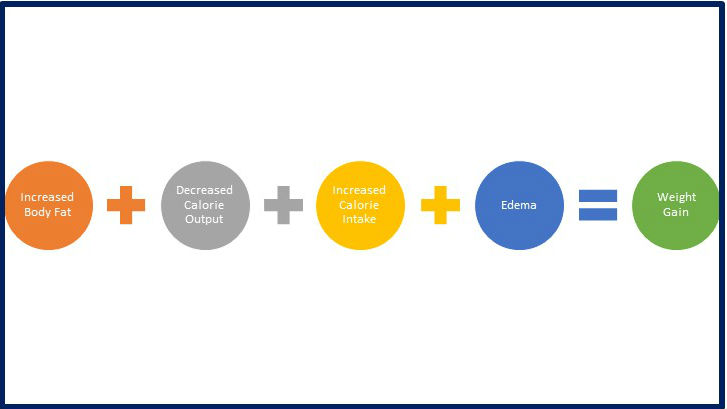Unplanned weight gain is not usually discussed as a side effect of cancer treatment, but when it happens, a patient can experience other possible negative effects.
For cancer patients, weight gain is usually not a result of increased muscle, which can be a good thing, but of increased fatty tissue, which may lead to chronic inflammation. Excess body weight is linked to an increased risk for other serious medical conditions such as heart disease, diabetes, high blood pressure and circulation problems. Extra weight may also make it more difficult to perform usual daily activities such as grooming, shopping, cooking, and cleaning. A higher body weight may also require larger doses of medications.
Unplanned weight gain during cancer treatment is often a result of physical and lifestyle changes such as increased caloric intake, deceased physical activity, decline in metabolism, lack of sleep, increased stress and anxiety, artificial menopause, and the accumulation of fluids (edema, ascites, or lymphedema). (See illustration below) These changes can be spurred by chemotherapy, hormonal therapy, surgery, or other medications such as steroids, cryoheptadine (antihistamines), or tricyclic antidepressants.
 Thankfully, there are ways to combat unwanted weight gain during cancer treatment. Maintaining a healthy body weight can help improve quality of life and decrease your risk for other health challenges.
Thankfully, there are ways to combat unwanted weight gain during cancer treatment. Maintaining a healthy body weight can help improve quality of life and decrease your risk for other health challenges.
Steps to Manage Weight Gain during Cancer Treatment
- Halt hunger. Eat 4 to 6 smaller meals rather than 2 to 3 big meals daily. You will feel fuller longer to help prevent hunger and improve mood.
- Hydrate to feel full. Sometimes when you reach for food, you may be thirsty, not truly hungry. Try water first. Add slices of veggies or fruits to a pitcher of water to give it a tasty flavor.
- Outsmart portion-distortion. If you are eating high-calorie foods or sweets, watch those portion sizes! Try slowly eating a half-serving first then see if you still feel hungry.
- Address edema. Cut sodium intake to less than 1,500 milligrams daily to start. Rinse canned foods to get rid of excess salt. Choose more potassium-rich foods like bananas, yogurt, citrus fruits and tomatoes.
- Track intake. Keep a food journal. Write down what you eat and the serving sizes too. It may not be what you are eating but the serving size or the frequency of what you eat that is causing weight gain.
- Swap for water. You may need extra fluid intake during cancer treatment. Instead of always reaching for juice, milk, or other calorie-carrying beverages, cut back on calories by choosing water instead.
- Be a breakfast person. Research show that people who successfully lost pounds and kept them off for more than a year are eating breakfast daily. Even a smoothie or low-fat shake works!
- Choose whole foods. Whole foods contain fiber, antioxidants and less sodium and fat than packaged choices. Reach for Mother Nature’s fruits, veggies and whole grains often.
- Eat at home more. Restaurant meals often carry more calories and additives that can add pounds and excess fluid if you are already at risk for weight gain. Stay at home and cook or ask a friend or family member for help preparing meals.
- Plan ahead. If you do need to eat away from home, decide your meal selection before you see the menu, or spilt an entrée with a friend. Ask for a take-home container when you meal arrives and put half the meal in the box before you start eating.
- Get sauce on the side. Ask for sauces, gravies, and dressings on the side instead of poured on your entrees and salads. This way you can control how much you use and not add unnecessary calories.
- Use caution with cocktails. Alcoholic beverages, beers, and wines are high calorie. At happy hour, ask for a spritzer or flavored water instead.
- Think lean when cooking. Bake, broil, grill, or boil instead of frying.
- Opt for low-fat dairy and meats. Choose the low-fat versions like low-fat milk or lean meat.
- Get active! Add movement to your day in small ways like making laps around the house, walking instead of riding to your mailbox, standing 5-10 minutes instead of sitting every hour. If your health and mobility allows it, exercise. For examples, lift small weights (1-3lbs) three times daily, take a flight of stairs, use stretch exercise bands, dance and move to music, or try low-impact exercise routines. Ask your healthcare team what physical activity is best for you before beginning any exercise program.
- Talk to an expert. Ask for a referral to a registered dietitian nutritionist and a physical therapist who work with people during cancer treatment. These health experts can help you stay strong during treatments and reduce side effects.
What if weight gain is unavoidable on your journey with cancer? Sometimes weight gain is not significant and other health issues are more important while you are receiving treatments. If that is your situation, don’t worry. You can embark on a healthier path when your treatment plan is completed. At that time you may have fewer barriers to weight control and more energy to address your new commitment to wellness.
Read "Struggling with Weight Loss during Treatment."
Margaret N. Martin, RD, MS, LDN, CDE, is a nutrition educator who blogs for PearlPoint Cancer Support, which offers guidance and support to adults impacted by cancer.
